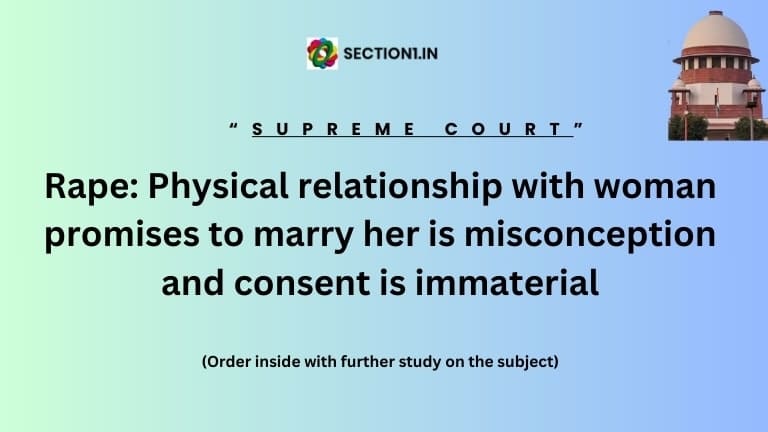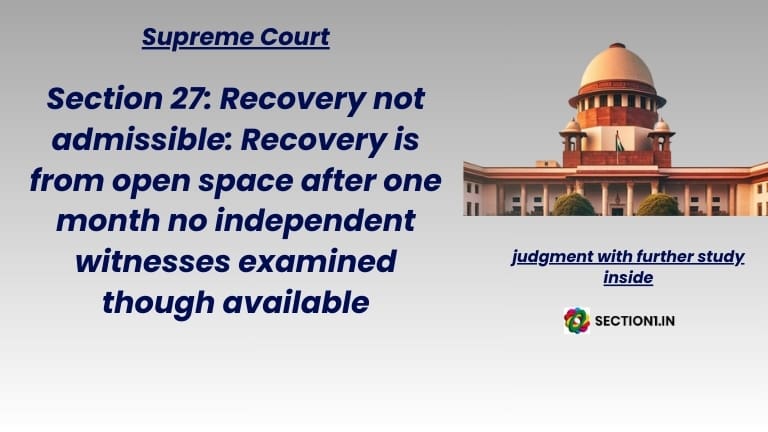Challenge against the dismissal of order under section 482 Cr.P.C
1. The appellant is accused no.4, who has been charged with an offence punishable under Section 306 of the Indian Penal Code (for short, ‘the IPC’). The appellant filed a petition under Section 482 of the Code of Criminal Procedure, 1973 (for short, ‘the Cr. PC’) before the High Court of Judicature at Madras. By the impugned judgment, the petition has been rejected.
Deceased died due to non-vacation of his house by his brother (accused)
2. The second respondent is the complainant. The second respondent had five brothers and two sisters. The deceased (Kanagasabha) was one of her two younger brothers. All of them were married except the deceased. On 5th March 2020, the deceased allegedly committed suicide by consuming poison. There was a dispute between the deceased and his elder brother Baskar @ Annamalai. Another brother of the deceased, Anandraj, had constructed a new house, which he sold to the deceased. However, the said house was occupied by Annamalai, his wife, son, and daughter Amutha (appellant). According to the case of the second respondent, Annamalai refused to vacate the house and filed a civil suit against the deceased. Though Annamalai (co-accused) failed in the suit, he declined to vacate the house. Therefore, the deceased sought the intervention of the local MLA. However, the local MLA could not resolve the dispute. The second respondent has made a general allegation that Annamalai and his family members, including the appellant, used to harass the deceased by insulting him on the ground that he was a bachelor. They used to tell the deceased to go anywhere else and die.
Quash petition filed after charge sheet was filed
3. After the charge sheet was filed, the appellant filed a petition for quashing, which was dismissed by the impugned judgment.
Hon’ble Supreme Court’s view
Except the appellant told the deceased to go out and die there is no other allegations brought on record
7. We have carefully perused the statements of the second respondent, her husband and other prosecution witnesses. Apart from a general allegation that the appellant, her father and other family members used to insult the deceased and tell him to go out and die, there is no other allegation made against the appellant. However, another incident was brought on the record by the witnesses. The marriage of the appellant was fixed on 4th September 2019. After reading the wedding card, the deceased objected to printing of his name on the card without his consent. Two days before 4th September 2019, there was a quarrel between the family of the appellant and the deceased on the issue. It is alleged that the appellant told the deceased not to attend the marriage.
Appellant was in USA and there is no material in record to show that any telephonic conversation occurred
8. The State Government has placed on record an additional affidavit along with a photocopy of the appellant’s passport. The photocopy shows that on 11th September 2019, the appellant left India from Chennai and reached the USA on 12th September 2019. On instructions, the learned counsel appearing for the first respondent accepted that till 5th March 2020, the appellant never returned to India. We may note here that in the charge sheet, no material is placed on record to show that any telephonic conversation occurred between the appellant and the deceased between 12th September 2019 and 5th March 2020.
Suicide notes did not give any evidence that the appellant was in touch with the deceased on telephone
9. The other material placed on record is in the form of four suicide notes allegedly written by the deceased. In the said suicide note, there is a general allegation against the appellant and her family members (her father, mother and brother) that they are responsible for his suicide. It is also stated therein that the local MLA had also given him a threat, and therefore, he committed suicide due to mental torture. Taking the suicide note as it is, the same does not help the prosecution at all, especially when there is no evidence on record to show that the appellant was in touch with the deceased on the telephone or in any other manner from 12th September 2019 to 5th March 2020.
A casual remark that is likely to cause harassment in ordinary course of things does not constitute offence under section 306 IPC
10. A Bench of three Hon’ble Judges in the case of Pawan Kumar v. State of Himachal Pradesh [(2017) 7 SCC 780] after considering the provisions of Sections 107 and 306 of the IPC, in paragraph 43, held thus:
“43. Keeping in view the aforesaid legal position, we are required to address whether there has been abetment in committing suicide. Be it clearly stated that mere allegation of harassment without any positive action in proximity to the time of occurrence on the part of the accused that led a person to commit suicide, a conviction in terms of Section 306 IPC is not sustainable. A casual remark that is likely to cause harassment in ordinary course of things will not come within the purview of instigation. A mere reprimand or a word in a fit of anger will not earn the status of abetment. There has to be positive action that creates a situation for the victim to put an end to life.” (emphasis added)
In the case of Amalendu Pal alias Jhantu v. State of West Bengal [(2010) 1 SCC 707], in paragraph 12, this Court held thus:
“12. Thus, this Court has consistently taken the view that before holding an accused guilty of an offence under Section 306 IPC, the court must scrupulously examine the facts and circumstances of the case and also assess the evidence adduced before it in order to find out whether the cruelty and harassment meted out to the victim had left the victim with no other alternative but to put an end to her life. It is also to be borne in mind that in cases of alleged abetment of suicide there must be proof of direct or indirect acts of incitement to the commission of suicide. Merely on the allegation of harassment without there being any positive action proximate to the time of occurrence on the part of the accused which led or compelled the person to commit suicide, conviction in terms of Section 306 IPC is not sustainable.” (emphasis added)
No act is attributed to the appellant proximate to the time of the suicide
11. Taking the charge sheet as correct, we find that there were no acts of incitement on the part of the appellant proximate to the date on which the deceased committed suicide. No act is attributed to the appellant proximate to the time of the suicide which was of such a nature that the deceased was left with no alternative but to take the drastic step of committing suicide. Therefore, no offence is made out against the appellant.
Party
Amudha versus The State represented by the Inspector of Police & Anr – CRIMINAL APPEAL NO.1642 OF 2024 (Arising out of Special Leave Petition (Crl.) No. 313 of 2024)
Further study
- Conviction: Witnesses cannot expected to remember the timing correctly after six years from the incident
- CRUELTY OR HARASSMENT NOT PROVED BY THE PROSECUTION
- Cancellation of bail: Cancelling the bail which granted by another single judge by examining the merits tantamount to judicial impropriety/indiscipline
- SECTION 306 IPC – INFORMANT HAS NO RIGHT TO WITHDRAW COMPLAINT OF A NON-COMPOUNDABLE OFFENCE
- Dying declaration: Section304-B IPC – In dowry death cases prosecution has to prove the initial burden







2 Comments
[…] Section 306 IPC: A casual remark that is likely to cause harassment in ordinary course of things doe… […]
[…] Section 306 IPC: A casual remark that is likely to cause harassment in ordinary course of things doe… […]